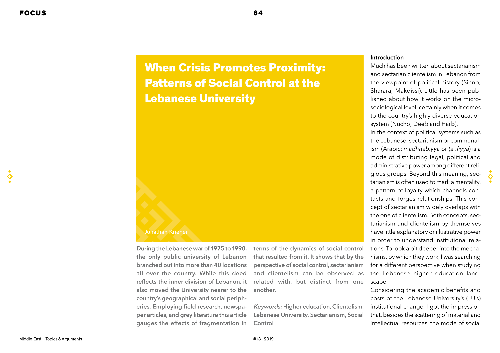When Crisis Promotes Proximity Patterns of Social Control at the Lebanese University
During the Lebanese war of 1975 to 1990, the only public university of Lebanon branched out into more than 40 locations all over the country. While this deed reflects the inner division of Lebanon, it also moved the University nearer to the country’s geographical and social peripheries. Employing fi...
Αποθηκεύτηκε σε:
| Εκδόθηκε σε: | Middle East - Topics & Arguments |
|---|---|
| Κύριος συγγραφέας: | |
| Μορφή: | Artikel (Zeitschrift) |
| Γλώσσα: | Αγγλικά |
| Έκδοση: |
Philipps-Universität Marburg
2019
|
| Θέματα: | |
| Διαθέσιμο Online: | Διαθέσιμο Online |
| Ετικέτες: |
Προσθήκη ετικέτας
Δεν υπάρχουν, Καταχωρήστε ετικέτα πρώτοι!
|
| Περίληψη: | During the Lebanese war of 1975 to 1990, the only public university of Lebanon branched out into more than 40 locations all over the country. While this deed reflects the inner division of Lebanon, it also moved the University nearer to the country’s geographical and social peripheries. Employing field research, newspaper articles, and grey literature this article gauges the effects of fragmentation in terms of the dynamics of social control that resulted from it. It shows that by the perspective of social control, sectarianism and clientelism can be observed as related with, but distinct from one another. |
|---|---|
| DOI: | 10.17192/meta.2019.13.8091 |
 Publikationsserver
Publikationsserver